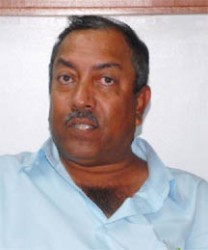Plans to enhance the levels of professionalism and raise service delivery standards among the country’s electricians and electrical contractors will be discussed at an October 12 meeting being held to resuscitate the currently defunct Guyana Electrical Contractors Association.
In an exclusive interview with Stabroek Business earlier this week, experienced electrical contractor and Chief Executive Officer of Ramcharran’s Electrical, Andrew Ramcharran, one of the prime movers behind the initiative to bring “structure and order” to the sector, said that in circumstances where the construction industry was continually unfolding, it was all the more important that a professional body exists. This would “ensure that the profession keeps pace with the requirements of the building sector,” he said. He added that one of the major preoccupations of the authorities ought to be with embracing the National Electrical Code of the United States as part of local electrical sector reform.
When the local electricians and electrical contractors meet on October 12 their agenda will include the resuscitation of the association, fashioning a structured training regime for professionals and ensuring that consumer awareness of the service delivery obligations of contractors is enhanced. “Apart from these specific objectives we will be hoping to organise ourselves to engage the government with a view to creating a modern set of rules and regulations for the industry,” Ramcharran said.

He told this newspaper that the initiative to reorganise the sector is taking place against the backdrop of an absence of consistent service provision standards. He mentioned that there is also a serious shortage of professionals, including both electricians and electrical contractors and a weak state-run inspection system resulting primarily from an acute scarcity of qualified inspectors.
According to Ramcharran, the absence of clearly defined standards and codes in the sector and scarce skills have combined to create a culture of indiscipline. “Part of the problem here is that, like in other professions, there is no shortage of service providers in the electrical sector who are prepared to take advantage of unwitting consumers.”
Ramcharran said that raising standards in the sector was all the more important in an environment where many new homeowners might be seeking to work with “tight budgets”. He explained that in circumstances where “every dollar counts” many home builders might be vulnerable to advice “that has to do with cutting corners, a situation that might be driven by the high interest rates on bank loans for house construction even though sub-standard work could cost the client more in the longer term.”
Ramcharran told Stabroek Business that local contractors were only too aware that the existing official electrical inspection regime in Guyana meant that they were likely to get away “with shoddy work”.
He explained that whereas in Guyana official inspection of electrical work is done only after the project is finished, the regulations in Trinidad and Tobago allow for a three-phased inspection system – after the conduits or raceways are laid; after the wires are pulled through and after the fittings are installed. “Obviously, the system in Trinidad and Tobago allows for a more efficient stage-by-stage inspection of jobs,” Ramcharran said.
Asked about the oft-expressed concerns of the Fire Department over outdated and faulty wiring in buildings in the commercial sector, Ramcharran said that the “continued dangers” posed by that problem were due, firstly, to the lack of clarity “as far as standards and regulations are concerned” and, secondly, to the fact that such rules as might exist were hardly enforceable given the lack of manpower and the ability of some people to find their way around the system.
Ramcharran, meanwhile, told Stabroek Business that the electrical sector was also compelled to endure inadequately trained electricians and the absence of structured regimes of apprenticeship which could at least ensure that persons secured some measure of “serious on-site experience” before venturing out on their own.
And according to Ramcharran, the quality of service delivery in the electrical sector was also being compromised by what he said was an inattention to the quality of fixtures and fittings being imported into Guyana for use in the sector. He said a feature of the items available to electricians was the variations in price and quality.
“There is really no evidence that these imports are subjected to any serious standards tests, otherwise their use would not have been allowed in the first place,” he said.
In the longer term he hopes the creation of a professional association would help to clearly define the respective functions of the government and the profession. “As I see it government should have a responsibility to provide the sector with clear, well-defined laws and regulations and facilitate quick legal recourse where issues arise. Additionally, there should be controls that protect the industry against sub-standard material and equipment. The industry, I think, should be more involved in training, including the setting of tests and the certification of trainees,” Ramcharran said.





